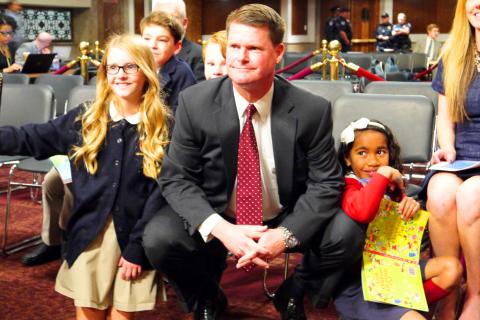Randall Schriver, who has been nominated for US assistant secretary of defense for Asian and Pacific affairs, on Thursday said he would make strengthening ties with security partners such as Taiwan a priority if his nomination is confirmed.
“If confirmed, it will be a priority to invest in our security partners in Taiwan and Singapore, and emerging partnerships with countries such as Vietnam,” Schriver said at a nomination hearing held by the US Senate Armed Services Committee in Washington.
“For this administration’s vision of a free and open Indo-Pacific to be realized, we must position ourselves to prevail in the long-term strategic competition we face vis-a-vis the People’s Republic of China,” he told the committee in his opening statement.

Photo: CNA
The US should continue to look for opportunities to cooperate with China where the two countries’ interests overlap, Schriver said, but he acknowledged that finding such opportunities would be a challenge.
“The Chinese Communist Party’s vision for a new security architecture in Asia with China at the center is in many ways at odds with our own aspiration for the region,” he said. “If confirmed, I will approach the duties of my position with an understanding that a rising China presents the most consequential security challenge of my generation.”
In response to a question from Senator Tom Cotton on whether the level of US sales of weapons to Taiwan is sufficient to deter Chinese aggression, Schriver answered: “We have more work to do there.”
Cotton also raised the concern that China always has a quantitative advantage over Taiwan’s military and he asked whether it also had a qualitative advantage right now.
“In certain niche areas they do, but overall, I think Taiwan maintains a qualitative edge to the point where they could deter and hopefully defeat a Chinese invasion,” Schriver said. “There are scenarios short of invasion, coercion scenarios, which are very dangerous for Taiwan.”
Schriver, a former Taipei Times columnist, served as chief of staff and senior policy adviser to then-US deputy secretary of state Richard Armitage from 2001 to 2003.
He took the helm of the Project 2049 Institute — a US think tank dedicated to researching security trends in Asia — after serving as deputy assistant secretary of state for East Asian and Pacific Affairs from 2003 to 2005.

CHAOS: Iranians took to the streets playing celebratory music after reports of Khamenei’s death on Saturday, while mourners also gathered in Tehran yesterday Iranian Supreme Leader Ayatollah Ali Khamenei was killed in a major attack on Iran launched by Israel and the US, throwing the future of the Islamic republic into doubt and raising the risk of regional instability. Iranian state television and the state-run IRNA news agency announced the 86-year-old’s death early yesterday. US President Donald Trump said it gave Iranians their “greatest chance” to “take back” their country. The announcements came after a joint US and Israeli aerial bombardment that targeted Iranian military and governmental sites. Trump said the “heavy and pinpoint bombing” would continue through the week or as long

TRUST: The KMT said it respected the US’ timing and considerations, and hoped it would continue to honor its commitments to helping Taiwan bolster its defenses and deterrence US President Donald Trump is delaying a multibillion-dollar arms sale to Taiwan to ensure his visit to Beijing is successful, a New York Times report said. The weapons sales package has stalled in the US Department of State, the report said, citing US officials it did not identify. The White House has told agencies not to push forward ahead of Trump’s meeting with Chinese President Xi Jinping (習近平), it said. The two last month held a phone call to discuss trade and geopolitical flashpoints ahead of the summit. Xi raised the Taiwan issue and urged the US to handle arms sales to

State-run CPC Corp, Taiwan (CPC, 台灣中油) yesterday said that it had confirmed on Saturday night with its liquefied natural gas (LNG) and crude oil suppliers that shipments are proceeding as scheduled and that domestic supplies remain unaffected. The CPC yesterday announced the gasoline and diesel prices will rise by NT$0.2 and NT$0.4 per liter, respectively, starting Monday, citing Middle East tensions and blizzards in the eastern United States. CPC also iterated it has been reducing the proportion of crude oil imports from the Middle East and diversifying its supply sources in the past few years in response to geopolitical risks, expanding

Pro-democracy media tycoon Jimmy Lai’s (黎智英) fraud conviction and prison sentence were yesterday overturned by a Hong Kong court, in a surprise legal decision that comes soon after Lai was jailed for 20 years on a separate national security charge. Judges Jeremy Poon (潘兆初), Anthea Pang (彭寶琴) and Derek Pang (彭偉昌) said in the judgement that they allowed the appeal from Lai, and another defendant in the case, to proceed, as a lower court judge had “erred.” “The Court of Appeal gave them leave to appeal against their conviction, allowed their appeals, quashed the convictions and set aside the sentences,” the judges